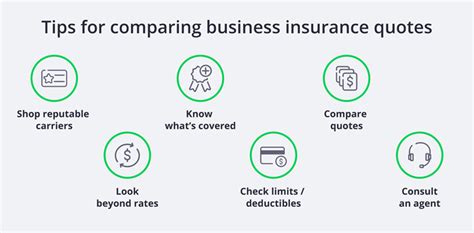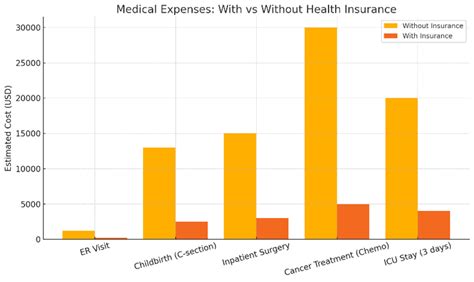Business Insurance For Small Businesses

For small business owners, protecting their ventures and ensuring long-term sustainability is paramount. One of the key aspects of this protection is acquiring the right insurance coverage. Business insurance acts as a safety net, safeguarding small businesses against various risks and potential liabilities. In this comprehensive guide, we will delve into the world of business insurance for small enterprises, exploring the types, benefits, and strategies to navigate this essential aspect of entrepreneurship.
Understanding the Landscape: Types of Business Insurance

The insurance landscape for small businesses is diverse, offering a range of coverage options tailored to specific needs. Here’s a breakdown of some common types of business insurance:
General Liability Insurance
General liability insurance is often the foundation of a small business’s insurance portfolio. It provides protection against bodily injury, property damage, and personal and advertising injury claims that may arise from the regular operations of the business. This coverage is crucial for mitigating risks associated with customer interactions, product use, and premises liability.
| Coverage Highlights | Key Benefits |
|---|---|
| Bodily Injury | Covers medical expenses and legal costs if a customer or visitor is injured on your premises. |
| Property Damage | Reimburses for damage to property caused by your business operations, such as a spill or accident. |
| Personal and Advertising Injury | Protects against claims of libel, slander, copyright infringement, or other forms of reputation damage. |

Professional Liability Insurance (Errors and Omissions)
Professional liability insurance, also known as errors and omissions (E&O) insurance, is essential for businesses that provide professional services. It covers legal costs and damages if a client sues for negligence, errors, or omissions in the services provided. This type of insurance is vital for industries such as consulting, accounting, legal services, and technology.
Product Liability Insurance
Product liability insurance is designed for businesses that manufacture, distribute, or sell physical products. It protects against claims of bodily injury or property damage caused by a defective product. This coverage is crucial for mitigating risks associated with product recalls, lawsuits, and reputation damage.
Commercial Property Insurance
Commercial property insurance safeguards a business’s physical assets, including buildings, inventory, equipment, and furnishings. It provides coverage for damages caused by events such as fires, storms, vandalism, and theft. For small businesses with significant investments in their physical space and inventory, this insurance is essential.
Workers’ Compensation Insurance
Workers’ compensation insurance is mandated by law in most states and provides coverage for employees who suffer work-related injuries or illnesses. It covers medical expenses, lost wages, and rehabilitation costs. This insurance protects both the employee and the business by ensuring prompt medical care and preventing costly lawsuits.
Tailoring Coverage to Your Business Needs

Every small business is unique, and the insurance needs of a bakery differ significantly from those of a technology startup or a consulting firm. It’s essential to assess your specific risks and tailor your insurance coverage accordingly.
Risk Assessment and Coverage Customization
Conduct a thorough risk assessment to identify potential liabilities and vulnerabilities specific to your industry and business model. Consider factors such as customer interactions, product safety, data security, and industry regulations. Based on this assessment, you can customize your insurance portfolio to address these unique risks.
Bundling Policies for Cost-Effectiveness
Bundling multiple insurance policies can often lead to cost savings. Many insurance providers offer package deals that combine general liability, professional liability, and other relevant coverages at a discounted rate. This approach not only simplifies your insurance management but also ensures comprehensive protection.
Choosing the Right Insurance Provider
Selecting the right insurance provider is crucial. Look for providers with a strong reputation, financial stability, and a track record of prompt claim processing. Consider their industry expertise and ability to provide tailored solutions for small businesses. Online reviews and recommendations from industry peers can also guide your decision.
Navigating the Insurance Process: From Quote to Claim
Understanding the insurance process, from obtaining quotes to filing claims, is essential for small business owners. Here’s a step-by-step guide to navigating this journey:
Obtaining Quotes and Comparing Policies
Request quotes from multiple insurance providers to compare coverage options and premiums. Ensure that the quotes are tailored to your business’s specific needs. Consider factors such as deductibles, coverage limits, and exclusions when making comparisons.
Understanding Policy Terms and Conditions
Read the fine print of your insurance policies carefully. Understand the terms, conditions, and exclusions to ensure that you have the coverage you need. Pay attention to policy limits, waiting periods, and any specific requirements for filing claims.
Filing Claims and Managing the Process
In the event of an insured loss, promptly file a claim with your insurance provider. Provide all the necessary documentation and evidence to support your claim. Stay in close communication with your insurer throughout the claims process to ensure a smooth resolution.
The Impact of Business Insurance on Small Business Success
Business insurance plays a pivotal role in the success and longevity of small enterprises. It provides a safety net against unforeseen events, helping businesses weather financial storms and maintain operational continuity.
Financial Protection and Peace of Mind
Having the right insurance coverage offers financial protection against lawsuits, property damage, and other liabilities. This peace of mind allows small business owners to focus on growth and innovation without constant worry about potential risks.
Building Credibility and Client Trust
Insurance demonstrates a commitment to professionalism and risk management. For businesses that deal with clients, especially in professional services or product sales, insurance coverage instills trust and confidence. It shows that the business takes responsibility for its actions and is prepared for unforeseen circumstances.
Attracting Investors and Partners
When seeking investment or forming strategic partnerships, insurance coverage is often a prerequisite. Investors and partners want to ensure that the business they’re aligning with has taken the necessary steps to mitigate risks. Comprehensive insurance coverage can enhance a small business’s appeal and credibility in the eyes of potential stakeholders.
Future Trends and Innovations in Business Insurance

The world of business insurance is evolving, driven by technological advancements and changing risk landscapes. Here’s a glimpse into the future of business insurance for small enterprises:
Technology-Driven Insurance Solutions
Insuretech, the intersection of insurance and technology, is revolutionizing the industry. From online platforms for comparing policies to AI-driven risk assessment tools, technology is making insurance more accessible and efficient. Small businesses can benefit from these innovations by streamlining the insurance process and accessing personalized coverage options.
Cybersecurity and Data Privacy Insurance
With the rise of digital transformation, cybersecurity risks have become a significant concern for businesses of all sizes. Insurance providers are developing specialized policies to address these risks, covering costs associated with data breaches, ransomware attacks, and privacy violations. As small businesses increasingly rely on digital tools, this type of insurance is becoming more crucial.
Sustainability and Environmental Risks
Environmental concerns and sustainability practices are influencing the insurance landscape. Small businesses that prioritize eco-friendly operations may find insurance providers offering incentives or tailored coverage for their sustainable practices. This trend reflects a broader shift towards responsible business practices and environmental stewardship.
Conclusion: Empowering Small Businesses with Insurance
Business insurance is a critical component of small business ownership, providing protection, peace of mind, and a foundation for long-term success. By understanding the types of insurance, tailoring coverage to specific needs, and navigating the insurance process effectively, small business owners can ensure their ventures are well-prepared for whatever the future holds.
FAQ
What is the difference between general liability and professional liability insurance?
+General liability insurance covers a wide range of risks associated with a business’s operations, including bodily injury, property damage, and personal and advertising injury claims. On the other hand, professional liability insurance (or errors and omissions insurance) is specifically designed for businesses that provide professional services. It protects against claims of negligence, errors, or omissions in the services provided. General liability insurance is more broad-based, while professional liability insurance is tailored to the unique risks of professional service providers.
How can I determine the right amount of insurance coverage for my small business?
+Determining the right amount of insurance coverage involves a thorough risk assessment. Consider the potential liabilities and vulnerabilities specific to your industry and business model. Factors such as customer interactions, product safety, data security, and industry regulations should be taken into account. Additionally, consult with insurance professionals who can guide you in selecting appropriate coverage limits based on your business’s unique needs.
What are some common exclusions in business insurance policies that I should be aware of?
+Common exclusions in business insurance policies may include acts of war, nuclear incidents, intentional acts or crimes committed by the insured, and certain types of pollution or environmental damage. It’s important to carefully review the policy documents to understand the specific exclusions that apply to your coverage. If you have concerns or need clarification, consult with your insurance provider or an insurance professional.
How often should I review and update my business insurance policies?
+It’s recommended to review your business insurance policies annually or whenever significant changes occur in your business. These changes may include expansion into new markets, the introduction of new products or services, changes in ownership or management, or modifications to your physical space or operations. Regular reviews ensure that your coverage remains up-to-date and aligned with your evolving business needs.



